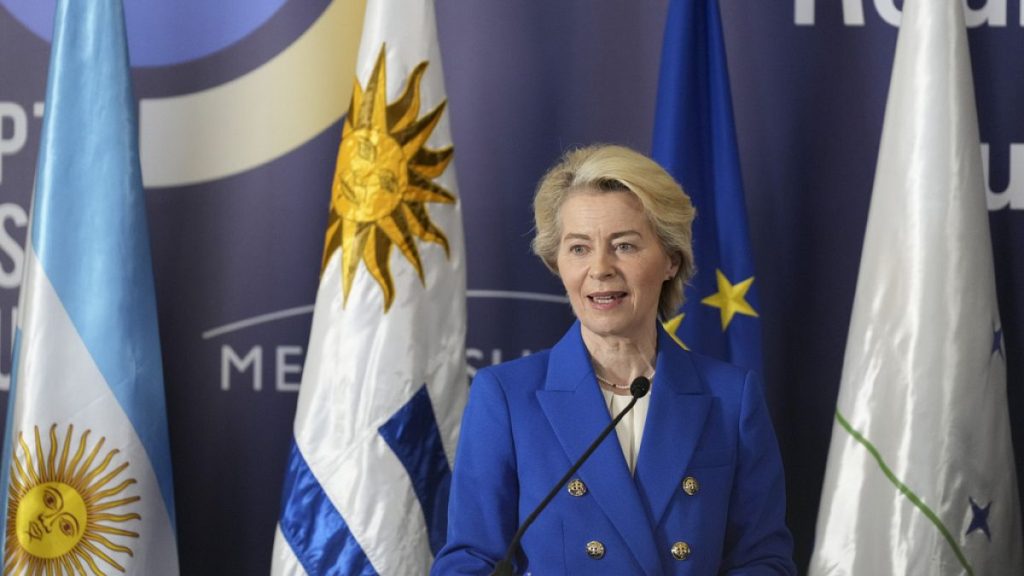The recently concluded trade agreement between the European Union and the Mercosur bloc (Argentina, Brazil, Paraguay, and Uruguay), while hailed by the European Commission as a landmark achievement, faces a turbulent path to ratification. The agreement, which aims to create a massive free trade area encompassing 780 million people, has reignited concerns, particularly within the European agricultural sector, about unfair competition and environmental consequences. While the Commission insists it has addressed these concerns with new provisions, skepticism remains high, and a protracted political battle is anticipated.
The core of the opposition stems from European farmers who fear being undercut by Mercosur agricultural imports produced under less stringent regulations. Protests erupted within days of the agreement’s announcement, with farmers demanding reciprocity in production standards and expressing doubts about the deal’s purported benefits for their sector. This apprehension echoes the resistance that stalled a previous version of the agreement in 2019, highlighting the deep-seated anxieties surrounding the potential impact on European agriculture.
The European Commission has sought to allay these fears by emphasizing the inclusion of robust environmental safeguards, a key demand of opponents in previous negotiations. Crucially, the Paris Agreement on climate change has been integrated as an “essential element” of the Mercosur deal, allowing for partial or total suspension if environmental standards are breached. This provision, alongside a legally binding commitment from Mercosur countries to halt illegal deforestation by 2030, represents a significant departure from previous trade agreements and is touted as a major win for environmental protection. Furthermore, the Commission has pledged to restrict imports to “deforestation-free” products by 2025, encompassing key commodities like soy, beef, palm oil, and timber.
However, the agricultural concessions remain largely unchanged from the 2019 version, with quotas for sensitive products like beef, poultry, and sugar gradually phased in over seven years. While a €1 billion reserve fund has been established to mitigate potential negative impacts on European farmers, critics remain unconvinced that this measure is sufficient to offset the anticipated influx of cheaper imports. This financial safety net, described by the Commission as an “insurance policy,” is unlikely to fully quell the anxieties of the agricultural sector, which continues to view the agreement as a threat to their livelihoods.
Beyond agriculture, the automotive industry has also played a prominent role in the negotiations. With European car manufacturers seeking new markets amid growing competition from China, the Mercosur agreement offers significant export opportunities. However, to protect their domestic industries, Mercosur countries have secured a longer phase-out period for tariffs on electric and hybrid vehicles, extending it from 15 to 18 years. While this concession represents a compromise, it underscores the complex balancing act required to satisfy the competing interests of various sectors on both sides of the Atlantic.
The political agreement reached by the Commission is merely the first step in a long and arduous ratification process. The agreement must now be translated and presented to the European Council for adoption, followed by a vote in the European Parliament. This stage is expected to be the most contentious, with France leading the opposition and actively seeking to build a blocking minority among member states. Poland has already voiced its opposition, while the positions of Ireland, the Netherlands, and Austria remain uncertain. Securing the support of Italy, a key player due to its population size, will be crucial for France’s efforts to derail the agreement. Italy’s stance remains contingent on sufficient guarantees for its agricultural sector, and the influence of its automotive industry, which stands to benefit from increased exports to Latin America, could sway the decision in favor of the agreement. The European Parliament’s vote also presents a further hurdle, with the position of Italy’s ruling party, Fratelli d’Italia, under scrutiny. The complex interplay of these political forces will ultimately determine the fate of the Mercosur agreement, making the path to ratification a challenging and uncertain one.














